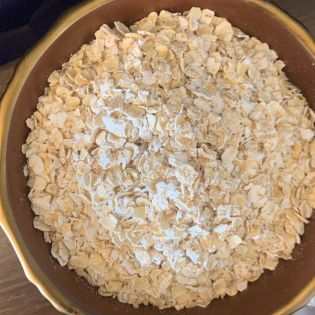OATS

Roasted Chickpeas are also known as garbanzo beans. They have been grown and eaten in Middle Eastern countries for thousands of years. They have a nutty taste and grainy texture that pair well with many other foods and ingredients. It is a rich source of vitamins, minerals, and fiber, and hence offers a variety of health benefits, such as aiding weight management, improving digestion, and reducing your risk of disease. In addition, this legume is high in protein and makes an excellent replacement for meat in many vegetarian and vegan dishes.
Nutritional Count Of Oats ( 1 Cup)
- Calories - 153.5kcal
- Proteins - 5.3g
- Fats - 2.6g
- Fiber - 4g
- Carbohydrates - 27.4g
High Source Of Fiber
- A bowl of oats can help you consume the recommended amount of fiber per day. With 4 g of fiber per cup, cooked oatmeal covers about 14 percent of the daily value (DV) of this nutrient, making it a good source. Eating a diet rich in whole grains and other food sources of fiber has been shown to be protective against cardiovascular disease, type 2 diabetes, and breast, colon, and rectal cancers.
Improves Digestive Health
- The fiber in oats is good for your overall health, but it’s particularly important for a well-functioning digestive system. Not only do oats provide insoluble fiber, which promotes regularity but also soluble fiber. Sources of soluble fiber have prebiotic properties. This can help feed the good bacteria living in the gut for a healthier microbiome.
Manages Cholesterol Levels
- Oats contain a soluble fibre called beta-glucan, which has been shown to reduce blood cholesterol levels if you consume 3g or more of it each day. It does this by binding with the cholesterol in your digestive tract, aiding its elimination from the body. A 40g serving of oats supplies 2g beta-glucan. Beta glucan decreased low-density lipoprotein cholesterol, or “bad cholesterol,” but did not affect high-density lipoprotein cholesterol, or “good cholesterol.
Helps In Managing Weights
- Oatmeal is rich in soluble fiber, so people tend to feel full more quickly after eating it than they do after consuming other foods. Feeling full can help a person reduce their portion size and achieve their weight loss goals. Not only is oatmeal (porridge) a delicious breakfast food, but it’s also very filling. Eating filling foods may help you eat fewer calories and lose weight. By delaying the time it takes your stomach to empty of food, the beta-glucan in oatmeal may increase your feeling of fullness. Beta-glucan may also promote the release of peptide YY (PYY), a hormone produced in the gut in response to eating. This satiety hormone has been shown to lead to reduced calorie intake and may decrease your risk of obesity. Oatmeal may help you lose weight by making you feel fuller. It does this by slowing down the emptying of the stomach and increasing the production of the satiety hormone PYY.
Helps In Managing Weights
- Oatmeal is rich in soluble fiber, so people tend to feel full more quickly after eating it than they do after consuming other foods. Feeling full can help a person reduce their portion size and achieve their weight loss goals. Not only is oatmeal (porridge) a delicious breakfast food, but it’s also very filling. Eating filling foods may help you eat fewer calories and lose weight. By delaying the time it takes your stomach to empty of food, the beta-glucan in oatmeal may increase your feeling of fullness. Beta-glucan may also promote the release of peptide YY (PYY), a hormone produced in the gut in response to eating. This satiety hormone has been shown to lead to reduced calorie intake and may decrease your risk of obesity. Oatmeal may help you lose weight by making you feel fuller. It does this by slowing down the emptying of the stomach and increasing the production of the satiety hormone PYY.
Improves Blood Sugar
- Type 2 diabetes is a common health condition, characterized by significantly elevated blood sugar levels. It usually results from decreased sensitivity to the hormone insulin. Oats may help lower blood sugar levels, especially in people with obesity or who have type 2 diabetes. These effects are mainly attributed to beta-glucan’s ability to form a thick gel that delays the emptying of the stomach and absorption of glucose into the blood. The beta-glucan in both oats and barley may also improve insulin sensitivity.
- Oats are also naturally gluten-free, while wheat is not. That said, due to the possibility of cross-contamination if you’re looking to make sure the oats are gluten-free, look for a label marking the oats as certified gluten-free. Oats are, in fact, among the most nutrient-dense foods you can eat. This means they are often considered a superfood. That said, there is no formal definition of the term superfood. Oats are a nutritious food packed with important vitamins, minerals, and antioxidants. In addition, they’re higher in soluble fiber and protein compared to other grains. Oats have unique components like the soluble fiber beta-glucan and antioxidants called avenanthramides.


